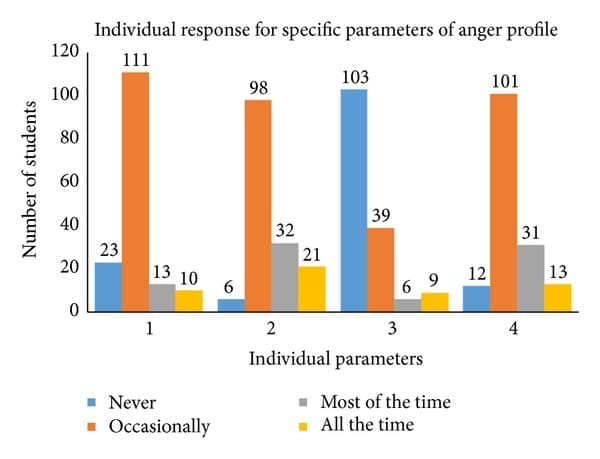Anger Issues Test
3 Min Free Anger Issues Test
Who Can Benefit From This Anger Issues Test?
This anger issues test can be beneficial for anyone who is interested in assessing their level of anger or identifying potential anger issues. Anger is a common emotion and can be a normal response to certain situations. However, when anger becomes excessive or is expressed in harmful ways, it can lead to negative consequences and impact various areas of life, including relationships, work, and physical health.
Individuals who are experiencing difficulties with anger, such as frequent outbursts, difficulty controlling anger, or problems with interpersonal relationships, may find this test particularly helpful in identifying areas for improvement. Additionally, those who are interested in personal growth and development may find the results of this test useful for identifying strategies to manage or reduce anger.

Anger Issues Test Accuracy

The accuracy of an anger issues test can vary depending on several factors, including the specific test used, how the test is administered, and the individual taking the test.
Anger issues tests are designed to assess various aspects of anger, such as frequency, intensity, and expression. While these tests can provide a useful starting point for individuals who want to assess their level of anger, it’s important to recognize that no single test can fully capture all aspects of anger.
Additionally, it’s important to consider that self-report measures, such as anger issues tests, may be influenced by factors such as social desirability bias, meaning that individuals may respond in a way that they think is socially desirable rather than providing accurate information about their true thoughts and behaviors.
Types of Anger Issues Test
State-Trait Anger Expression Inventory (STAXI):
This is a widely used anger assessment tool that measures the presence of various aspects of anger, such as intensity, frequency, and expression.
Novaco Anger Scale and Provocation Inventory (NAS-PI):
This is a tool that assesses anger by measuring anger frequency and intensity, as well as potential triggers.
Multidimensional Anger Inventory (MAI):
This is a self-report measure that assesses the frequency and intensity of various aspects of anger, including verbal and physical expression.
Anger Disorders Scale (ADS):
This is a tool that assesses anger by measuring the presence of various anger-related symptoms, such as irritability, aggression, and resentment.
Anger Management Scale (AMS):
This is a self-report measure that assesses various aspects of anger, including frequency, intensity, and coping strategies.
Buss-Perry Aggression Questionnaire (BPAQ):
This is a self-report measure that assesses various aspects of aggression, including physical and verbal aggression, as well as anger-related emotions and attitudes.
Treating Anger Issues
Treating anger issues can involve various strategies depending on the underlying causes and individual needs. Here are a few suggestions:
- Identifying and managing underlying conditions: In some cases, anger issues may be related to underlying conditions, such as depression or anxiety. Seeking a diagnosis and treatment plan from a mental health professional can help identify and manage these conditions.
- Anger management therapy: Anger management therapy, such as cognitive-behavioral therapy (CBT), can be effective in treating anger issues. CBT can help individuals identify triggers, develop coping strategies, and improve communication and problem-solving skills.
- Stress reduction techniques: Reducing stress through techniques such as mindfulness, deep breathing, and exercise can help individuals manage anger and reduce its impact on daily life.
- Improving communication skills: Improving communication skills, such as active listening and assertiveness, can help individuals express themselves effectively and avoid miscommunication that can lead to anger.
- Supportive relationships: Developing and maintaining positive relationships with supportive individuals can help reduce stress and improve mood. This can include reaching out to friends or family members or joining support groups.
- Medication: In some cases, medication may be used to treat underlying conditions related to anger issues, such as depression or anxiety.

